As the job market undergoes dramatic shifts due to mass layoffs and resignations, organizations are looking for cost-effective ways to hire top talent. They are seeking innovative solutions to ensure their recruitment process is efficient and cost-effective.
Why?
Because the demand for top-skilled talents never goes out of trend. However, as the competition to hire the most talented professionals is becoming tough, recruiters are tapping into every available resource to ensure they hire the best candidates.
Video interviews have become an invaluable tool for talent recruitment because of their ability to:
- Save time and money
- Remove geographical barriers
- Automate candidate screening
In fact, recent data show that video interviews have made it easier for 74% of recruiters to interview and shortlist candidates.
So, let's understand what exactly video interview assessment is, whether they are efficient enough to make the hiring process seamless, and the advantages and disadvantages of using it.
What is a video interview assessment?
Technology has changed the way we live and work, allowing us to work from anywhere, at any time. This adaptability has also transformed the way we do interviews.
Rather than having face-to-face meetings or phone calls, recruiters can use online video assessments to virtually interview potential candidates.
Simply put, a video interview assessment is a tool that allows recruiters to conduct online interviews for open positions using a camera, a microphone, and the internet.
Recruiters can take advantage of this assessment to screen candidates remotely and move them through the hiring process. Video interviews are an excellent tool for recruiters to utilize early in the recruiting process because they allow them to assess a large number of applications in a short period of time.
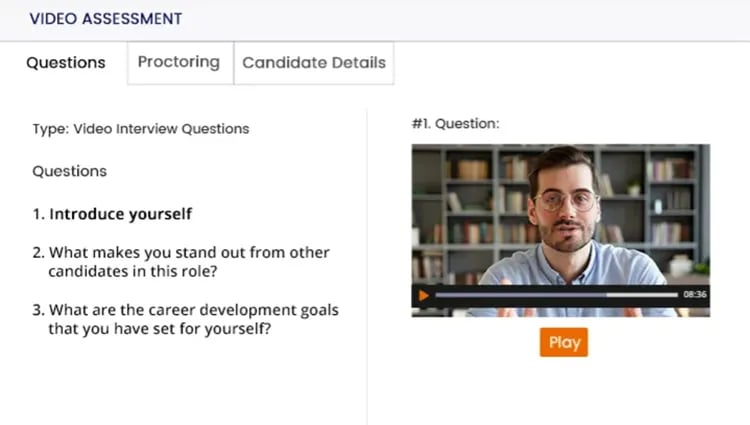
How does video interview assessment works?
Online video assessment employs a slew of tools, such as cameras, laptops, microphones, and so on, to provide a seamless interview experience for both recruiters and candidates.
|
Want to reduce slow and tedious candidate screenings? iMocha's video interview software will reduce interview time by 70%. |
What are the types of video interviews?
Recruiters can utilize two types of video interviewing to assess candidates across the globe:
- One-way video interview
- Two-way video interview
1. One-way video interviews
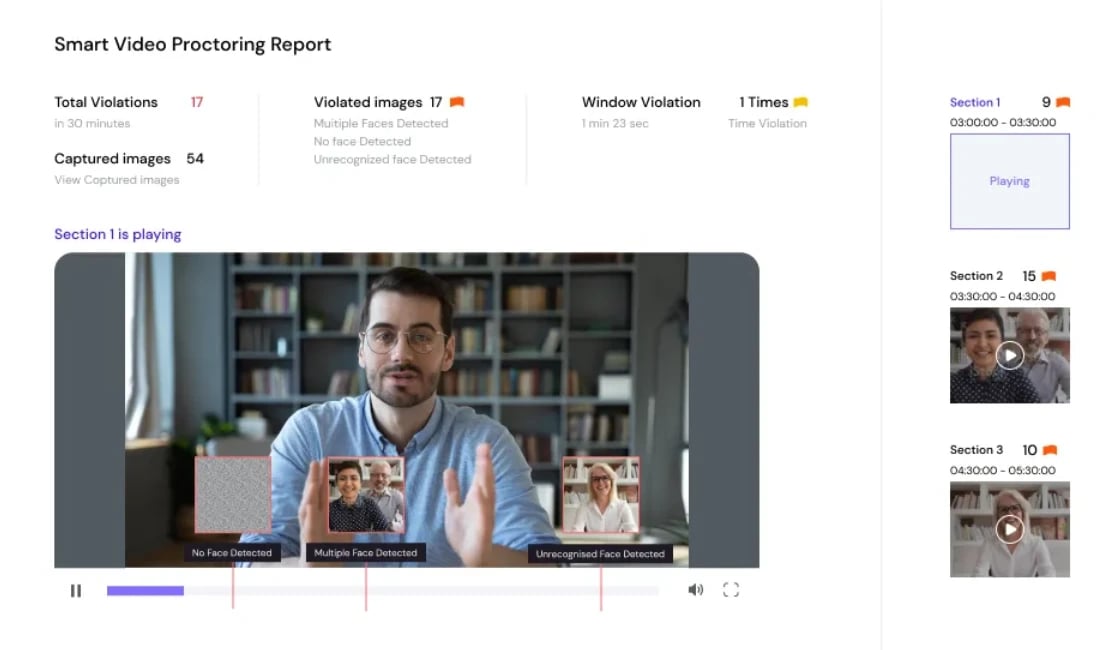 A one-way video interview is basically a short-recorded video interview that enables recruiters to access candidates' responses more efficiently. This type of video interview is also known as on-demand video interviews, pre-recorded video interviews, and asynchronous interviews.
A one-way video interview is basically a short-recorded video interview that enables recruiters to access candidates' responses more efficiently. This type of video interview is also known as on-demand video interviews, pre-recorded video interviews, and asynchronous interviews.
In this interview type, recruiters can ask candidates to video record their responses using the provided link to the required questions displayed on the screen from anywhere and anytime before the deadline.
This process streamlines recruitment efforts by enabling recruiters to send bulk invitations to multiple applicants and easily coordinate interviews based on the availability of recruiter and candidate alike, saving time and energy.
In fact, recruiters can watch the interviews at their convenience and share them with other managers for review. It provides them with a better understanding of the candidate from the beginning, helping them to make a more informed hiring decision.
2.Two-way video interviews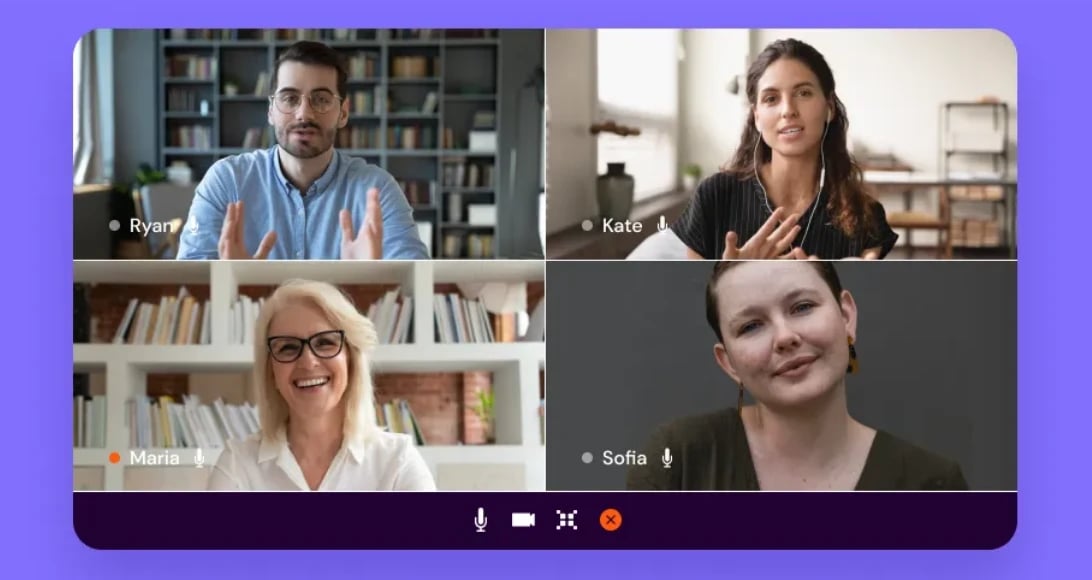
A two-way video interview is a face-to-face video interview conducted via a webcam. It enables two or more people to come together and speak to each other face-to-face without being physically in the same room.
This video assessment is currently the most popular type of online recruitment interview.
Want to know why?
Well, a study by Glassdoor shows that a phone interview adds up to 8.2 days in the hiring process, whereas a one-on-one interview only adds 5.3 days.
Plus, a survey of 506 companies revealed that 47% use online video assessment in their hiring process to shorten the hiring timeframe.
That means a two-way video interview or live video interview allows hiring managers and candidates to connect to come live for video interviews and talk to each other in real-time. It eliminates the need for candidates to travel to the office for their interviews, making the process more convenient and accessible.
|
Struggling to identify top candidates? Discover how iMocha can help you hire high-performing candidates while maintaining the organizational skills bar. |
How efficient are video interview assessments?
Let's understand how efficient online video assessments tools are for through advantages and disadvantages:
Advantages of video interviews
- Reduces hiring time:
By incorporating video assessments, you can eliminate the need for in-person meetings and arrange other co-related activities. It saves both employers' and candidates' time. This method enables you to access a larger talent pool and filter out candidates within minutes of their application.
- Reduces hiring cost:
Recruiting potential employees can be costly and time-consuming. Arranging interviews can become a large-scale task, requiring recruiters to contact candidates via phone or email in order to coordinate a mutually suitable time. This process can take days to complete.
On the other hand, by screening candidates through recorded interviews and interviewing multiple people via video platforms, you can expedite the hiring process and save money in the long run.
- Automate candidate screening:
Using video interviews, you can manage how candidates go through the hiring process. Typically, you can use this tool to add predetermined questions and mark candidates based on their responses to those questions.
It eventually allows you to screen a large number of applications quickly and efficiently. Additionally, this tool enables you to compare and track their progress simultaneously.
- Eliminate bias:
This interview assessment assists you in eliminating unconscious bias from the employment process. Believe it or not, some recruiters engage in unconscious prejudice without even recognizing it.
The one-way interview process records all hiring interviews, which other recruiters can view for evaluation, future reference, and audits.
- Standardize the hiring process:
You can create a more consistent hiring process by utilizing recorded video interviews. This ensures that all applicants are asked the same set of questions, eliminating any potential bias that may be present in traditional interviews. Additionally, video interviews provide an easily accessible and convenient platform for candidates to showcase their skills, regardless of their role.
- Improve the quality of hire:
This interview process provides an individualized way to assess potential hires, allowing you to assess their skills in real time. Additionally, this method gives candidates more time to thoughtfully consider and respond to questions, allowing them to provide more meaningful answers. Ultimately, this interview method can assist you to make a more informed decision and improve the quality of your hire.
- Removes geographical barrier:
This tool is beneficial for connecting candidates who live in different locations and cannot meet in person. Additionally, it provides a great way to recruit candidates seeking flexible work, allowing you to tap into untapped talent pools.
Disadvantages of video interviews
- Unexpected technical difficulties:
No matter how much you and your candidates have prepped, virtual interviews can still be derailed by unexpected hiccups, such as a power outage, spotty internet connection, or device malfunction. These sudden interruptions can disrupt the conversation and make the experience stressful for everyone involved.
- Creates personality bias:
Though video interview assessment can reduce bias, it has been observed that it introduces its own forms of bias. Such as, some recruiters are more likely to select candidates who appear confident and positive, potentially overlooking the technical knowledge required for the job.
- Devoid of personal connection:
Virtual interviews can make it difficult for candidates to understand the work environment and culture before joining, introducing an element of surprise and potential anxiety. Additionally, in a one-way interview, the interviewer is limited in their ability to ask personalized questions about the candidate's background and character.
|
Struggling with higher screening time and low-quality candidates? Discover how iMocha can reduce technical screening time by 80% |
How to conduct video interview assessments?
If you wish to conduct an online video assessment, then all you need is the following:
- Create a process plan
- Select, set up, and test your devices
- Candidates should be notified as soon as possible
- Make a suitable interview environment
- Set up a feedback process
Even though some companies conduct video interviews through various online meetings apps such as Skype, zoom, Teams, and more, there is a much better way of conducting both live coding interviews as well as a one-way video interview. It is through dedicated interview software that offers various in-built functionalities to make the hiring process more seamless.
Skill intelligence tools, like iMocha, provide various interview conducting capabilities such as a whiteboard for collaboration, interaction with your Applicant Tracking System (ATS), interview recording, and integrated assessment forms.
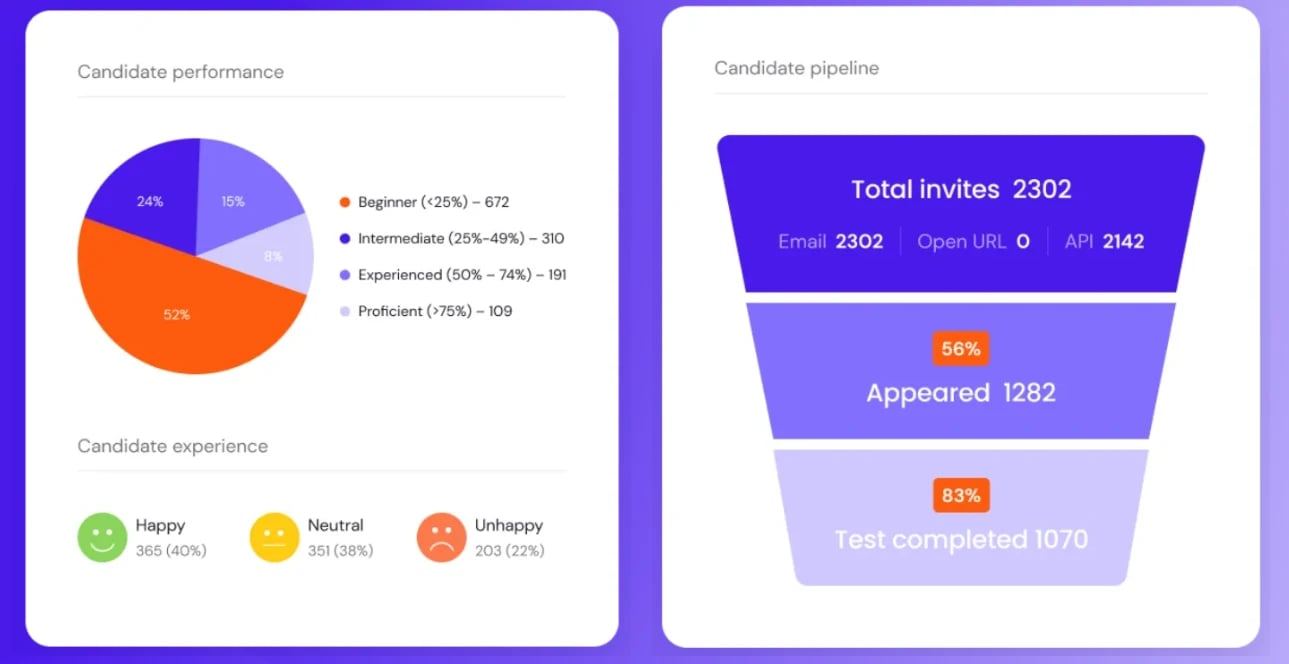 The video interview feature of this tool allows you to do the following tasks:
The video interview feature of this tool allows you to do the following tasks:
- Evaluate the technical as well as communications of candidates through a single assessment
- Add questions on the display screen
- Customize video interviews according to job roles
- Check status through centralized dashboards
Other features include:
- Branding customization
- Video interviewing ROI analytics,
- collaboration tools to comment
- Role-based access control for adding multiple stakeholders
- Open-invite interviews that candidates can access from any browser
Additionally, this tool's live coding interviews feature allows you to remotely analyze the candidate's programming and problem-solving skills in real-time.
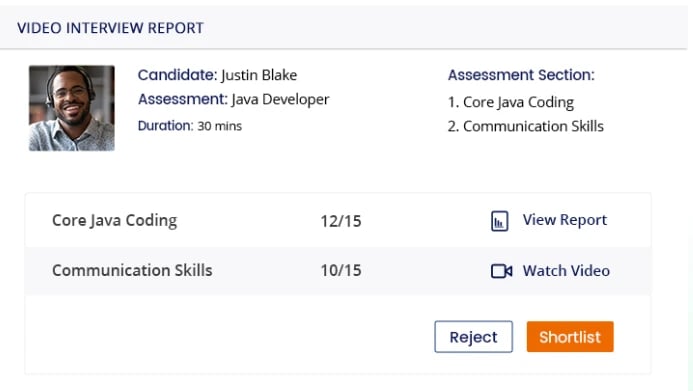 Its best-in-class proctoring system eliminates the potential of cheating while maintaining candidate integrity.
Its best-in-class proctoring system eliminates the potential of cheating while maintaining candidate integrity.
Also Read: Top 10 Best Video Interviewing Software and Platforms for Virtual Interviews
|
Still wondering how to hire skill-fit candidates while saving costs and time? Speak to an iMocha expert! |
Conclusion
Overall, recruiting a quality candidate is a time-consuming process that necessitates recruiters' attention to even little facts about the candidates. Above and beyond, various recruiting methods cause candidates to lose interest in the position and hunt for other options willing to employ more swiftly. As a result, virtual interview evaluation aids in streamlining the process and ensuring that only qualified applicants are hired.
FAQ
1.What is the purpose of video interviews?
Video interviews are used to find and hire potential employees more quickly. It enables enterprises to meet virtually with job candidates without traveling, saving time and money. Through video interviews, employers can also assess a candidate's personality, communication skills, and qualifications for the job.
2.Why is video assessment important?
Video assessment is essential because:
- It allows recruiters to understand candidate's skills better
- It helps employers save time and money
- It allows employers to evaluate a larger pool of candidates
- It eliminates geographical barriers
3.Are video interviews effective?
Yes, video interviews are effective, as they enable hiring managers to:
- Quickly compare candidates
- Accelerate hiring process
- Create flexible interactions
- Eliminates scheduling complications

